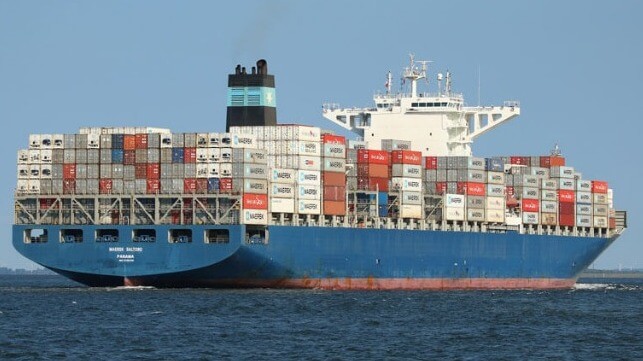Dali Sister Ship Back Underway After 23 Days Adrift in Micronesia

A sister ship to the infamous containership Dali that destroyed Baltimore’s Francis Scott Key Bridge is also recovering from mechanical troubles. The vessel operating under charter as the Maersk Saltoro is reported to be back underway after drifting for 23 days in the Pacific after a main engine failure.
The 116,850 dwt containership was built in 2015 by Hyundai in South Korea. Like the Dali, she is also sailing under the flag of Singapore and managed by Synergy Marine under charter to Maersk. She has a capacity of 9,971 TEU. The vessel previously drew attention when U.S. officials boarded it in Baltimore in September 2024 to conduct an inspection due to it being a sister ship to the Dali.
The vessel's main engine failed while it was in the Pacific traveling to China after having departed Chile on December 27. The tug company Pacific International reports that its Marshall Islands Towing and Salvage Company deployed a tug on January 22 which took aboard four technicians in Kosrae, in the Federated States of Micronesia, before proceeding to the stricken vessel. The Maersk Saltoro was reported to be adrift approximately 550 miles west of Pohnpei, also in Micronesia.
Temporary repairs have been completed according to reports in the Chilean media and the vessel was able to get back underway on February 5. The schedule is now showing the ship will reach the Nansha New Port in China on February 17 depending on weather conditions during the remainder of the voyage. It will be a month behind schedule and then continuing to Hong Kong, Shanghai, and Ningbo. It is unclear when or where permanent repairs will be completed.
A spokesperson for Maersk confirmed to the Chilean media that they were monitoring the situation and in contact with the vessel’s owners. They said the ship and crew as well as its cargo were in no danger and the owners assured them the refrigerated containers were continuing to operate during the breakdown.
The breakdown has drawn extensive attention in Chile as the vessel was part of a seasonal service known as the Cherry Express. Growers are concerned because the vessel was loaded with 1,353 refrigerated containers of cherries shipped to China to coincide with the Lunar New Year’s celebrations. The worry is that the long transit times will affect the quality of the shipment and decrease its value in addition to the impact of the late arrival.
Prices of cherries are already reported to be depressed this year. They are one of Chile’s largest exports with the media saying 120 million boxes were sent to China. Reportedly 25 containerships were part of the seasonal service with more than 17,000 containers of cherries shipped from Chile’s port of San Antonio.
